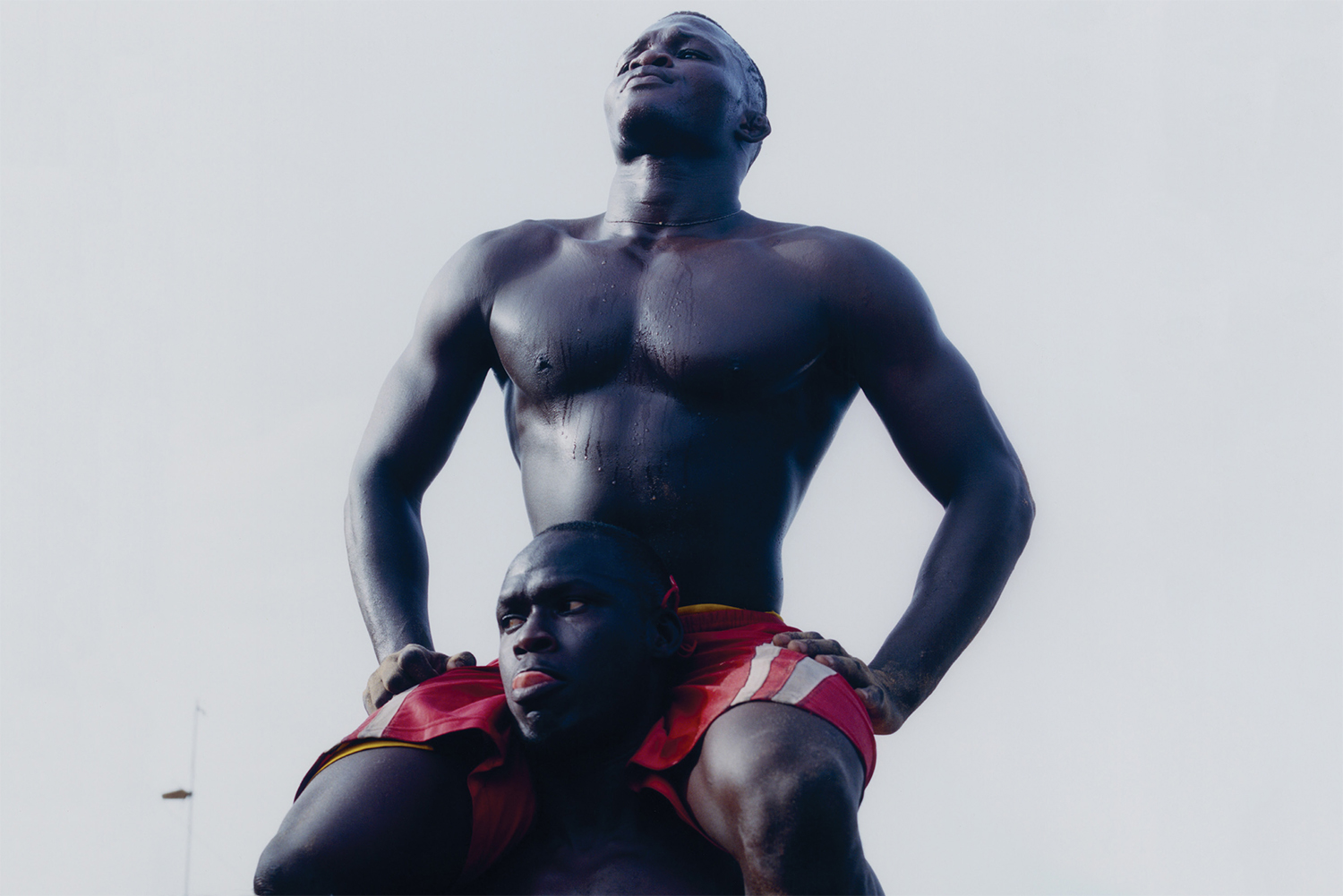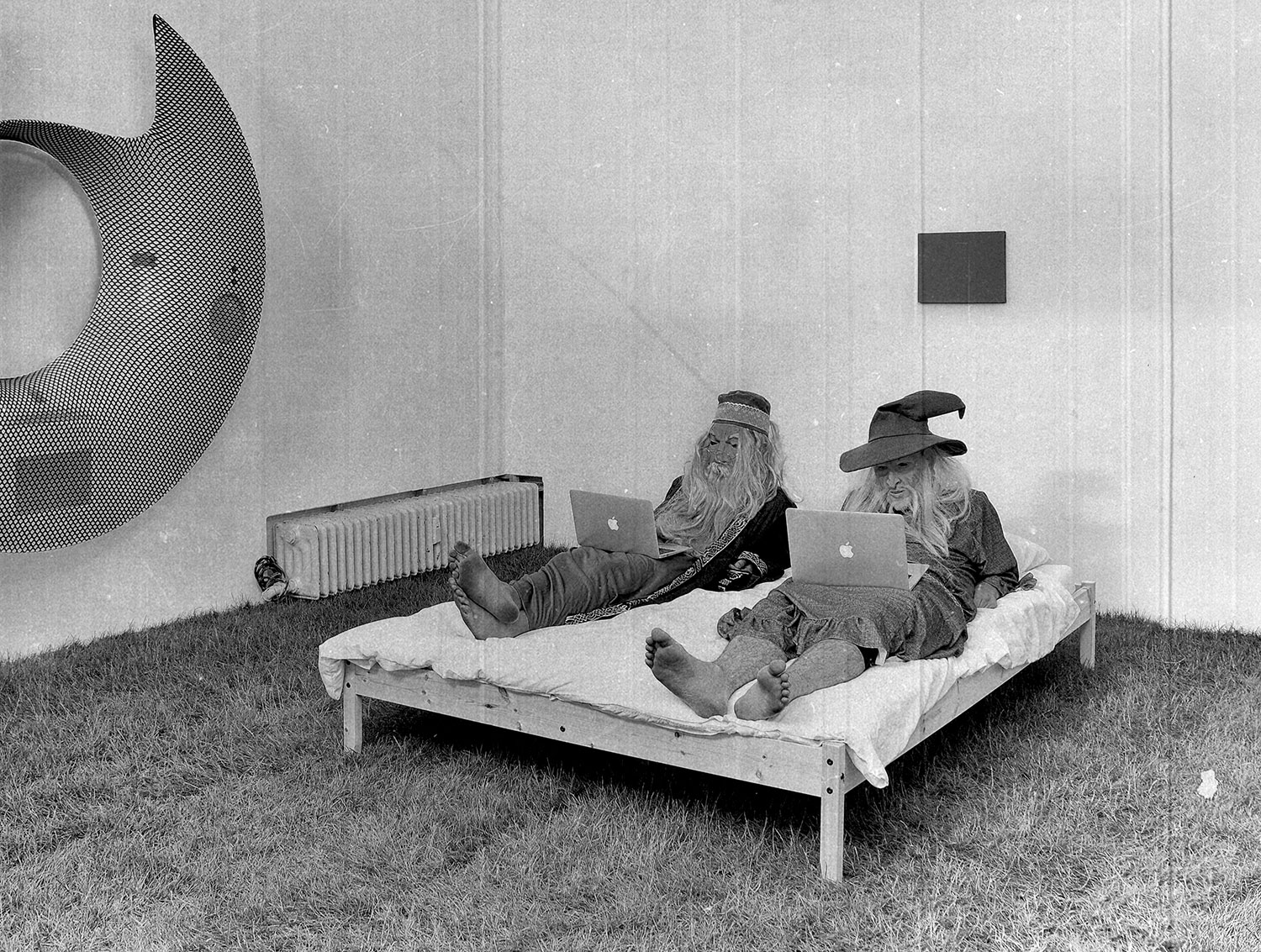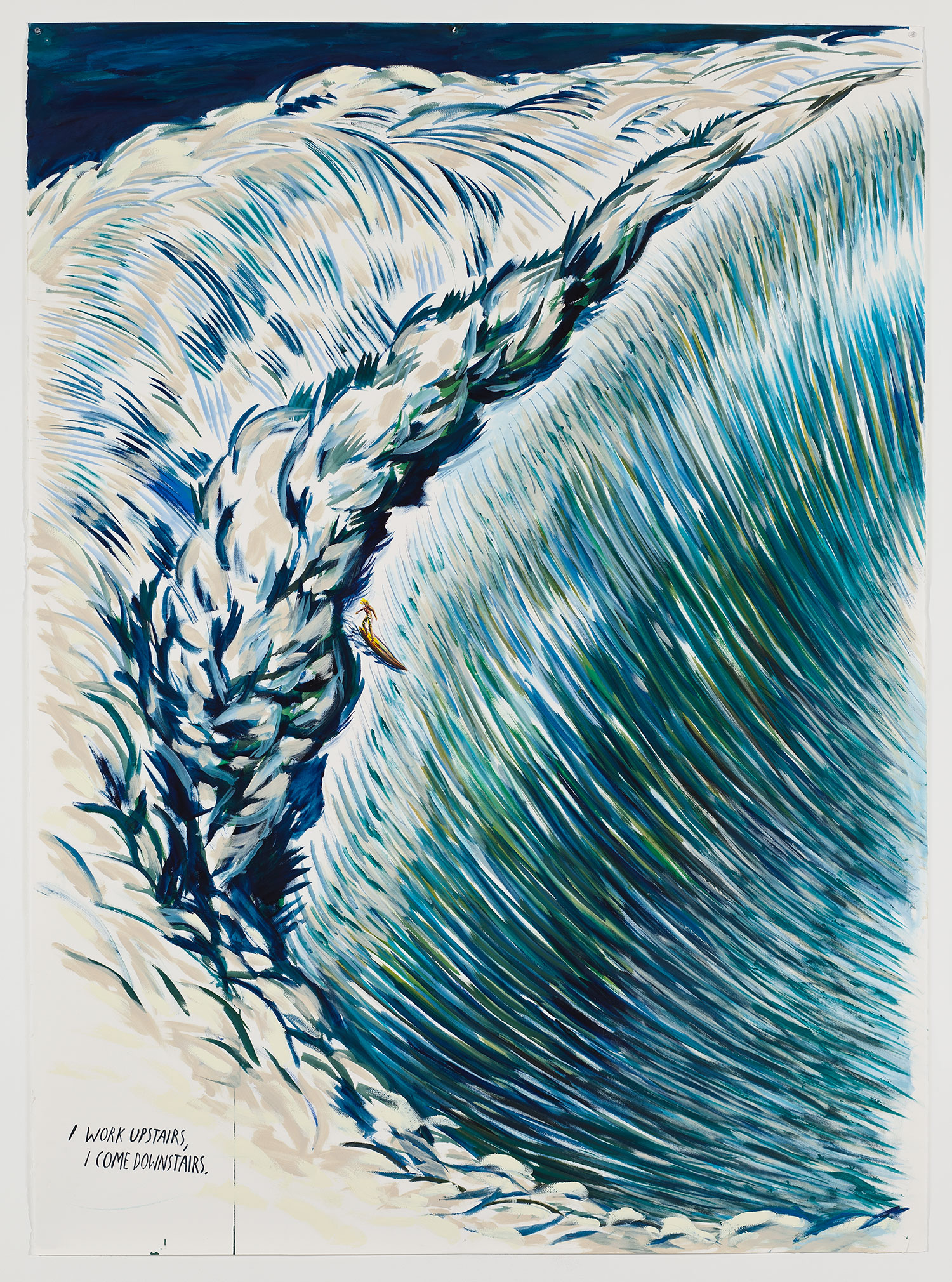
Death drops: breathtaking moves in any vogue dance, sudden and dramatic collapses that meet the ground with explosive impact. NON arrived in a similarly swift, graceful and devastating fashion through Angel-Ho’s Death Drop from Heaven, a deliverance of this gospel and a sonic statement of intent in May 2015. A preface from the artist remains included in the SoundCloud description: “The death drop has been around since the first fallen angel. The correct term of fallen, being misappropriated by Western traditions of Christianity, a death drop is a gesture of an angel proclaiming their position as messengers descending to Earth. To prevent catastrophic histories repeating themselves.” An inherent loudness is present through the choral distortions, shuddering bass and sawn-off electronics that make up the mix. In headphones, it demands full attention. The same music on a sound system feels like an attempt to rewrite and re-canonize the physical and cultural architecture of club spaces that are so often tainted with white-supremacist heteropatriarchy. A visceral, expansive and thoroughly exhausting half hour of uncompromising sound, Death Drop from Heaven proved to be a more-than-incisive inauguration of — and introduction to — NON WORLDWIDE. You don’t land an orbital drop without leaving a crater, itself a proclamation saying, “We’re here.”
NON arrived with their own statement, their website currently reading: “African artists, and of the diaspora, using sound as their primary media, to articulate the visible and invisible structures that create binaries in society, and in turn distribute power.” Angelo Valerio of South Africa, performing as Angel-Ho; Belgian-raised and London-based Melika Ngombe Kolongo, AKA Nkisi; and Richmond, Virginia’s Chino Amobi cofounded the collective across continents, unified by a vision: A state to resist the mechanisms, binaries and boundaries that cause the divisions that disenfranchise marginalized people. Though each cofounder also operates in capacities outside of sonic artistry for NON, they focus their efforts on sound to create this new space. Chino Amobi recorded conversations about NON’s activities with Nkisi and Angel-Ho respectively, quotes from which are included throughout this feature.
“Sound is definitely one of the best places to actually do things,” Nkisi tells Chino Amobi. Named for the nkisi sculptures utilized by witch doctors to heal, channel spiritual powers and seal contracts, predating colonial times in Congolese cultures, she makes music that’s energetic and invigorating. Hardcore electronic styles such as doomcore and sounds from Central and Western Africa coalesce in melodic, highly percussive tracks that are simultaneously intense and freeing. “Sound is such a public space because you can share with so many people at the same time, people listening to the transmission of sonics and informatics, like knowledge through sound. There’s so much more that can happen in that context.”

“The public space, it’s like an architecture that doesn’t have the bondage of certain discourses that are tied into this history of ‘We’re making progress,’ you know?” Chino Amobi considers. His own work is spread across disciplines, and thus industries. Practicing visual art at university alongside his own performance-and-sound-art project as Diamond Black Hearted Boy, he sought to capture his experiences and perceptions of being othered by society through music. He eventually opted to produce under his own name with the intent to remove the “division between the sound and [him]self.” Last year saw the release of his Airport Music For Black Folk EP, with a title that smirks at the critical engagement with and acclamation of Brian Eno’s Music For Airports (1978) while quite literally articulating the difference between airport experiences for black and non-black folk. Stemming from his observation that airports are meant to be international spaces yet ooze Westernness and Eurocentricity, its tracks are caught between the textural familiarity of woozy beats and ambience, and the turbulence of industrial percussion, noise and isolated vocals. Its tension is not that of a split between sides; rather, it’s an internal maelstrom.
“You don’t have to have a degree or show your CV to have an authority in your speaking, or bring a community in that haven’t necessarily moved through these systems — that I love about it,” Chino Amobi elaborates to Nkisi, speaking of the self-initiated nature of NON as a platform for sound. “The same hierarchies don’t work in those spaces,” Nkisi suggests of the sound environments created by NON, where power structures of the status quo are simultaneously reified and torn down. “Those hierarchies are totally outside of it because they exist totally outside of capital.”
NON’s approach to resisting and dissolving oppressive structures thus far has been two-pronged: weaponizing music to “destabilize and de-territorialize” audiences, and empowering other African and African diaspora artists to have the autonomy to do the same. This means that their balancing act of information transmission to differing groups is crucial to their ability to meet their goals. There’s a prevailing sense that the group is careful to not bare all to press who no doubt have questions about the mechanisms, heritages and ambitions of NON, especially considering the collective’s activities across different scenes: club music, experimental music, sound art, streetwear, visual art and more. Each of those contexts has questions about the other settings — and each has historically been exclusive of black and brown artists in varying ways. Even in preparing for this article, the cofounders were stringent on how much information they should give away. The thought seems to be that those who would become “citizens” of NON — those who share NON’s ideologies, commitments and willingness to contribute — would get the message. They feel compelled to speak for themselves, even publishing the NON Quarterly, with written and visual contributions from NON citizens, as a means of maintaining autonomy and “exorcising the language of domination” that permeates discourses throughout the colonial world.

“It’s still a collectivity — emotions were shared,” Nkisi explains. The dualism of body and mind achieved through sound effectively opens channels to audiences, providing opportunities to be evocative. “Certain sounds can include so many time-spaces at once, like certain sounds can also activate certain memories that are collective. I feel like sound is also a really nice way to do a form of slow journalism, where you can also analyze surroundings and analyze what’s happening in the world,” Nkisi continues. Angel-Ho concurs in his conversation with Chino Amobi, considering music in its political sense: “It’s amazing. Everyone wants to document — and everyone should document — what’s happening around you. It’s so fab. That’s why I love the internet.”
People are able to disseminate information from sound freely and quickly, without having to go through certain systems of knowledge. Nkisi elaborates on this potential: “A lot of the times with language, if you don’t have the systems of knowledge in you then you’re not included in that discourse. Sound can transmit information or knowledge without using their language or their classifications. Sound for me is where I’ve gotten into conversation with different types of people and I think that’s something that’s really beautiful. I’m multilingual but I never feel any language that I speak can actually express myself fully. Information can be transmitted and understood so much easier with sound.” Nkisi also notes that sound can essentially be mechanized to deliver information intended for certain communities even through a wider listenership. Chino Amobi draws parallels to how the UK’s pirate radio stations operated by blocking scanners and developing internal codes between broadcasters and listeners, thus developing a community independent of and liberated from existing institutions.
Already spread across three continents with their own respective heritages, the triumvirate looks to dismantle differing instances of colonial oppression specific to their circumstances. The medium of sound provides the opportunity for common ground to share battles on and to empower themselves and unify within. This has been scalable across the globe, the collective expanding their goals as well as the NON state, evolving from NON RECORDS into NON WORLDWIDE. They released their first compilation in November 2015, with contributions from the likes of dystopian dancehall mutator GAIKA, and RudeBoyz, a pioneering crew for the burgeoning, house-deviant South African sound of Gqom. FAKA and MHYSA both went on to share EPs through the platform, and NON has embarked on multiple projects with Mexican communal party crew N.A.A.F.I. In spite of the emphasis recent years have had on border maintenance, and in spite of music industries where artists are held back for their gender, color and sexuality, the message of NON carries and resonates through the undeniable potency of sound. That message is rarely twisted — as Angel-Ho puts it, “Our politics is our lives.”

It’s this unity that enthralls Angel-Ho: “All those places that we’ve been performing in and DJing in, all of these spaces have [a] small community — not communities, but people who love to come to our shows come to our shows, you know?” NON’s most recent showcase is their theatrical performance at CTM Berlin, The Great Disappointment. Bringing together multiple dancers choreographed by Ligia Lewis, DJ Lady Lane and R&B singer Embaci, along with all three cofounders, the three-night performance piece was positioned as a hybrid between a “variety show and spectacular abstraction.” “We got the opportunity to create a theatre piece and show we have vision for not only music, art, culture and curating events — we envision a way of living. It’s everything.”
“I feel like that’s when we’re actually doing our jobs, when we’re playing music, live sets or DJ sets, that theater piece we just did,” Nkisi says. It was one of the more expansive world-building projects the group has undertaken, though the focus remains on creating those spaces sonically. “I’ve been reading into Congo cosmologies and it’s really beautiful how their warrior societies perceived dreams with two doors. One door is real truth, the dream of imagining, and the [door of] false truth [is] fantasy and desire. Sound is such a nice way to create dreams, even just by activating certain things. Being able to work on that imagination.”
“It almost feels like you are becoming,” Chino Amobi says of Nkisi’s music. “You are a dream architect in a collective way. I know that’s a lot,” he laughs. Much of these dreams are reified through his visual and fashion-oriented work, too. His Instagram is a steady stream of NON paraphernalia, from concept sock designs to merchandised garments and explorations of NON’s iconography. The style is sharp and incisive, with signature typography that channels the same future-now aesthetics of militant government agencies in Hollywood action flicks. “Wear the skin of your oppressor,” one T-shirt reads, screen-printed in punk black and white. “NON is a hammer which we use to crush the enemy,” reads another. NON emulates and essentially infiltrates other power structures, as embodied by its machete-and-sickle logo. It’s here, in the visual manifestations of NON, that their message is most ambiguous due to such iconography. The pieces prioritize the wearer over the beholder, badges of honor for a state that shall only be as strong as its citizens. Empowerment through representation. They’re the closest physical translation of that which NON primarily articulates through music, made as an accompaniment as opposed to a substitute.
“One thing that I like about what we do with the name NON, it allows for a space for all of those mediums to move through it. And I think that that’s what we did at CTM. All those mediums and disciplines were able to exist in that space. They harmonized. There was a flourishing in ways that they can all stand alone but when they’re together like that, they’re just so strong. Blossoming is the perfect word for it,” Chino Amobi affirms, prompted by Angel-Ho. “Because it felt like new life.” Though sound is their primary medium, NON believes stylistic and disciplinary diversity can unlock the potential for new spaces. It speaks to their vision as a collective too, as the global, borderless state continues to expand. With lived and planned experiences that resonate with the disenfranchised, marginalized and oppressed worldwide, their message has struck a chord with their intended audience. Two years on, the movement gains momentum.





